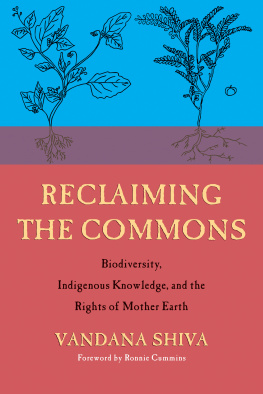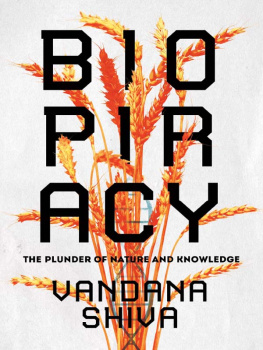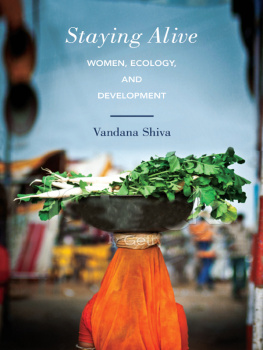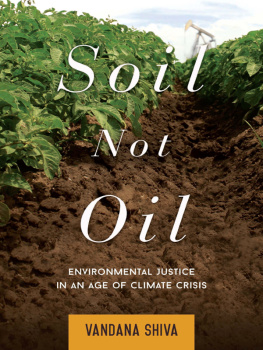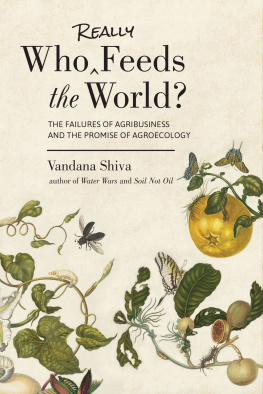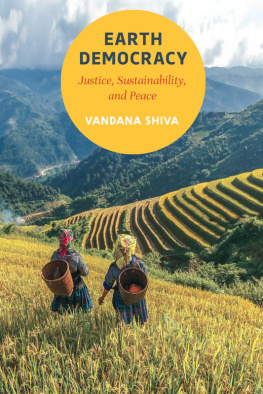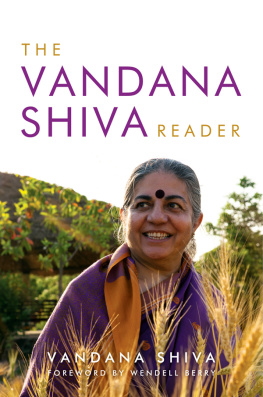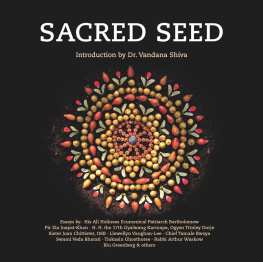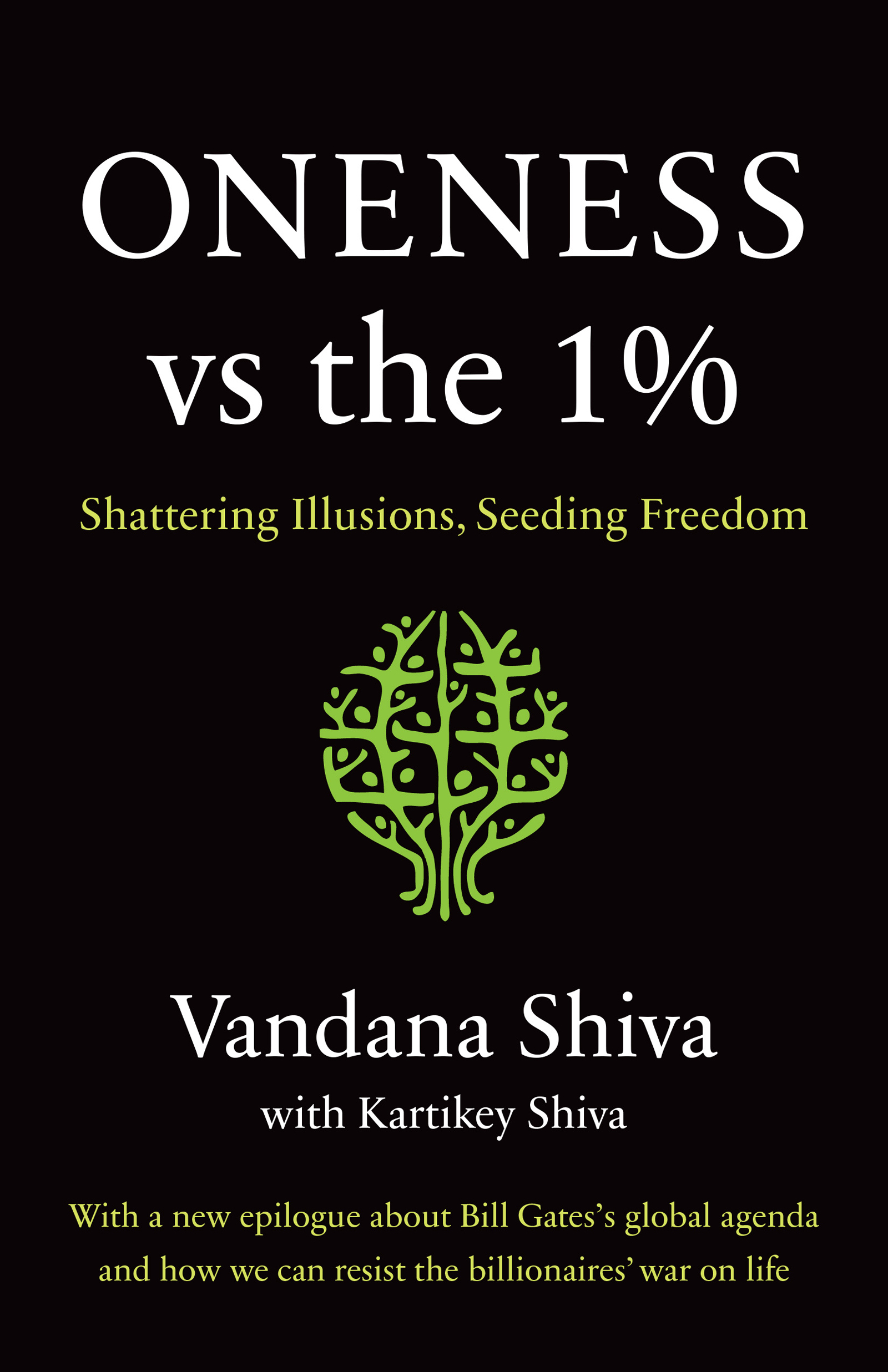Contents
Guide
Pagebreaks of the print version
VANDANA SHIVA is a world-renowned environmental thinker and activist, a leader in the International Forum on Globalisation, and of the Slow Food Movement. Director of Navdanya and of the Research Foundation for Science, Technology and Ecology, and a tireless crusader for farmers, peasants and womens rights, she is the author and editor of a score of influential books, among them Making Peace with the Earth ; Soil Not Oil ; Globalizations New Wars; Seed Sovereignty, Food Security: Women in the Vanguard ; and Who Really Feeds the World?
Shiva is the recipient of over twenty international awards, including the Right Livelihood Award (1993); Medal of the Presidency of the Italian Republic (1998); the Horizon 3000 Award (Austria, 2001); the John Lennon-Yoko Ono Grant for Peace (2008); the Save the World Award (2009); the Sydney Peace Prize (2010); the Calgary Peace Prize (2011); and the Thomas Merton Award (2011). She was the Fukuoka Grand Prize Laureate in 2012.
KARTIKEY SHIVA is a shatterer of illusions, grower of freedom, and agent of light.
All of us who care about the future of Planet Earth must be grateful to Vandana Shiva. Her voice is powerful, and she is not afraid to tackle those corporate giants that are polluting, degrading and ultimately destroying the natural world.
Jane Goodall, UN Messenger of Peace
Her fierce intellect and her disarmingly friendly, accessible manner have made her a valuable advocate for people all over the developing world.
Ms. magazine
A rock star in the worldwide battle against genetically modified seeds.
Bill Moyers
Shiva is a burst of creative energy, an intellectual power.
The Progressive
One of the worlds most prominent radical scientists.
The Guardian
ALSO BY VANDANA SHIVA
Who Really Feeds the World? (2016)
Seed Sovereignty, Food Security: Women in the Vanguard (2015)
Making Peace with the Earth: Beyond Resource, Land and Food Wars (2012)
Soil Not Oil: Climate Change, Peak Oil and Food Insecurity (2009)
Globalizations New Wars: Seed, Water & Life Forms (2005)
Water Wars: Privatization, Pollution and Profit (2002)
Stolen Harvest: The Hijacking of the Global Food Supply (2000)
Biopiracy: The Plunder of Nature and Knowledge (1997)
Ecofeminism (co-authored with Maria Mies, 1993)
Monocultures of the Mind: Biodiversity, Biotechnology and Agriculture (1993)
The Violence of the Green Revolution: Ecological Degradation and Political Conflict in Punjab (1992)
Staying Alive: Women, Ecology and Survival in India (1988, 2010)
ONENESSTHE 1
SHATTERING ILLUSIONS, SEEDING FREEDOM
VANDANA SHIVA
WITH
KARTIKEY SHIVA
Chelsea Green Publishing
White River Junction, Vermont
London, UK
Copyright 2018, 2020 by Vandana Shiva & Kartikey Shiva.
All rights reserved.
No part of this book may be transmitted or reproduced in any form by any means without permission in writing from the publisher.
Oneness vs. the 1%: Shattering Illusions, Seeding Freedom was first published in India in 2018 by Women Unlimited (an associate of Kali for Women) 7/10, FF, Sarvapriya Vihar, New Delhi - 110 016.
This edition published by Chelsea Green Publishing, 2020.
Project Editor: Brianne Goodspeed
Indexer: Nancy Crompton
Printed in the United States of America.
First printing August 2020.
109876543212021222324
Library of Congress Cataloging-in-Publication Data
Names: Shiva, Vandana, author. | Shiva, Kartikey, author.
Title: Oneness vs. the 1% : shattering illusions, seeding freedom / Vandana Shiva, with Kartikey Shiva.
Description: White River Junction, Vermont : Chelsea Green Publishing, 2020. | First published in 2018 in India. | Includes bibliographical references and index.
Identifiers: LCCN 2020029374 (print) | LCCN 2020029375 (ebook) | ISBN 9781645020394 (paperback) | ISBN 9781645020400 (ebook) | ISBN 9781645020417 (audio)
Subjects: LCSH: Income distribution.
Classification: LCC HC79.I5 S45 2020 (print) | LCC HC79.I5 (ebook) | DDC 339.2dc23
LC record available at https://lccn.loc.gov/2020029374
LC ebook record available at https://lccn.loc.gov/2020029375
Chelsea Green Publishing
85 North Main Street, Suite 120
White River Junction, Vermont USA
Somerset House
London, UK
www.chelseagreen.com
Contents
What is it to live, to be alive? What is it to live well, to be well?
What is knowledge, what is intelligence?
What is ecology, what is economy?
What is freedom, what is democracy?
What is our future?
We are compelled to return to these basic questions in our timestimes of the possible extinction of our species, as the current dominant model of knowledge, of wealth creation, and of representative democracy violates planetary boundaries, the rights of the diverse species that share this planet, as well as the human rights and freedoms of most people. Times when the 1% controls the wealth and power to destroy our planet and our common lives, with no responsibility or accountability for their actions, because they have found clever ways to create illusionsof the separation of humans from the earth, and of the 1% from the rest of society, as if we share no common wealth, and no common future.
Being well and the experience of wellbeing are timelessoff the clock. Wealth means a state of wellbeing. The market has come between us and our wellbeing, severing us from our potential and needs. The market has also allowed its own consolidation, accompanied by the consolidation of global power.
In 2010, 388 billionaires controlled as much wealth as the bottom half of humanity; this number came down to 177 in 2011; to 159 in 2012; 92 in 2013; 80 in 2014; and 62 in 2016; it shrivelled to a mere eight in 2017. By 2020, it seems, there will be only ONE.
In 2008, during the global economic crash when people lost their homes and jobs, billionaires consolidated their ownership of industry across the world. Stock prices had bottomed out, and the wealthiest billionaires bought out the economy at bottom-dollar prices. It was too convenient to be a matter of chancethis was the deployment of the money machine.
The money machine is programmed to bulldoze, destroy, aggregate and accumulate, externalise and excavate. Like the cancer cell which does not know when to stop growing, convergences, mergers and concentration are the only logic the money machine understands. And just as the cancer cell ends up destroying the host organism, the money machine, too, will destroy the planet and our societies from which it draws its support.
We must reclaim our intelligence and creativity to resist the money machine and create non-violent alternatives. We must reclaim the market from the money machine, and our lives from billionaire dictators. We must reclaim our real freedoms, and not be seduced by the false freedoms of free trade, corporate rule, algorithm-run democracy, and consumerism. We must stand firm and reclaim the meaning of wealth and the conditions for being well.
Will the end game for humanity be the domination of the ONE power of Big Money, or will we, in our Onenessas one earth community, one human communityshut down the Operating System of domination and extermination, to allow our potential for self-organisation and creativity to seed another future?
The diversity of cultures and languages, and with them, our imagination, is being lost. Social violence and disintegration have become the norm everywhere, as economic polarisation and inequalities deepen. Every society is facing a crisis of democracy, as Big Money hijacks the process of representative democracy, and elections are used to divide people through hate and fear; they divert the public consciousness from the real roots of their insecurity, thus preventing them from organising and rising to protect the planet, to rebuild their societies, and to reclaim their economies and democracies.


